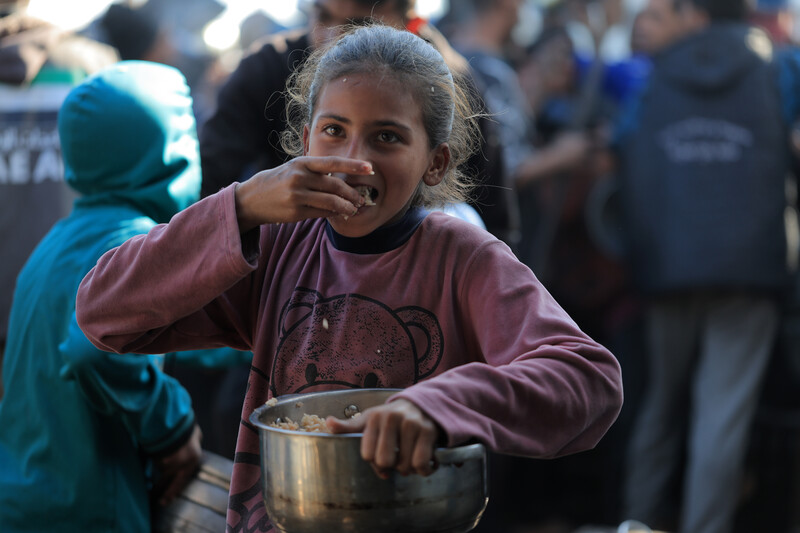The Electronic Intifada 6 February 2025

Children receive food from a charity kitchen in Khan Younis on 1 January.
APA imagesIn a small tent on the outskirts of al-Mawasi in Khan Younis, my sister Yara lives with her two children Yasmin and Muhammad.
Before Israel’s genocidal assault, my sister and her family lived with me and mine in a modest home in Gaza City. Yara cared for her two children, while her husband, Ibrahim, worked in the market selling water to earn money for the family. I worked as a teacher at a nearby school. Our lives were simple but filled with love and peace.
We were displaced at the beginning of the Israeli attacks in October 2023 when our home became unsafe under Israel’s relentless and indiscriminate bombing. We fled on foot, carrying only what we could.
After a long journey fraught with danger, hunger, and fear, we found refuge in a small tent on the outskirts of Khan Younis.
Muhammad, my 4-year-old nephew, has autism. He seemed to live in a world entirely his own. For him, life revolved around one thing: a red apple.
Muhammad didn’t fully understand the chaos around him, nor did he care. Apples were his sanctuary. He loved the texture, the color, scent, and the way they spun between his small fingers.
These weren’t just apples to him — they were his safe haven in a world full of fear and disorder.
But apples became rare during genocide. The last apple my sister had managed to get in weeks she gave to Muhammad. He refused to eat it, insisting instead on keeping it close. The apple became dried out, cracked and lost its vibrant red color, but to Muhammad, it remained his most precious treasure.
”Muhammad, can you give Mama the apple?” Yara asked him one evening as he clutched it tightly.
He shook his head firmly, silently telling her: “Don’t take my world away.”
Yara didn’t push further.
A child’s love
That particular night, a cold December evening, with the sound of bombs tearing through the sky, something remarkable happened. Muhammad, without a word, approached Yasmin. He broke his dried-out apple in half and handed her a piece. Looking at her with innocent yet profound love, he said in his small, stumbling voice: ”Yasmin, you eat.“
A child who couldn’t understand the horrors of war understood hunger. A boy who lived in a closed world opened his heart to share the only thing that gave him comfort.
The next morning, my sister woke to the sound of her children playing outside the tent. Muhammad was sitting on the ground, holding what was left of the apple’s peel. He was drawing lines in the sand with it. His drawings didn’t make sense. It was as if he were creating a new world from the ashes of ours.
Life in that tent wasn’t easy, and hunger was an unrelenting enemy. Yet Muhammad’s apple became a symbol for the family — one of hope, love and resilience even in the darkest times.
Muhammad’s father Ibrahim, Yara’s husband, was separated from us during the chaos. He now spends most of his day in the market selling water and trying to secure food and aid for the family. His absence from the tent is difficult, but he does everything he can to support us.
My sister Yara now says:
”Muhammad taught me that the smallest things can carry the greatest meanings.”
Perhaps no one will remember this story after the war ends, but I will never forget it.
Muhammad, the boy who lived in his own world, taught me that love can be bigger than hunger and that even a dried-out apple can be the greatest gift in the world.
Rajaa Altana is a writer in Gaza.

